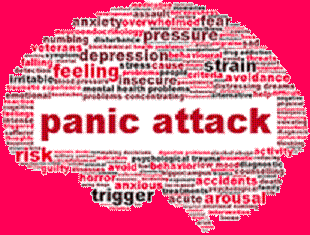Panic attacks
Panic attacks or panic disorder is a state of psychiatric unevenness and anxiety that lasts few minutes and causes repeated and unexpected attacks of intensive fear.[1]
Risk factors and causes
- Genetics and heredity, if one identical twin has panic disorder, then it’s more likely for the other twin to develop the condition (in 40% of conditions).[1][2]
- Being a women means you are twice more likely to have panic disorder than men.[9]
- Neurotransmitters imbalance may increase your risk of developing a panic attack.[2]
- Hormone imbalance and anxiety may also increase the risk of developing a panic attack.[1][3][4]
- Psychopathy, psychopaths who live with the fear of death, of having a heart attack etc… panic disorder often occurs in such people, especially in family members (not necessary that they have the same blood ) who share common fears.[5][6][7]
- If you are 25 years old or older, it’s nearly impossible to diagnose children with panic disorder, chronic sufferers often have medical checkups for symptoms related to other conditions before a diagnosis of panic disorder is made.[8]
Symptoms
Patients With panic disorder suffer of an acute onset of at least 4 of the following symptoms followed by month at least of persistent fear of death.
- Fear of dying or of having a heart attack
- Dyspnea, Sensation of shortness of breath
- Fainting or Dizziness
- Racing heart or Palpitations
- Shaking or shivering
- Chills or hot flashes
- Sweating
- Feeling of choking
- Nausea or feeling sick
- Tingling or Numbness
- Chest pain or discomfort
- Fear of losing control
- Hallucinations or euphoric feelings of unreality
- Uneven feelings and tendency for isolation, tendency of detachment from the surrounding
- Solitude
- Change in behavior and isolation from work, school etc..
- Going crazy
Diagnosis
- Physical examination to rule-out and exclude underlying medical diseases if there and supported with blood tests and a psychiatric evaluation.
- Tests for drug and alcohol addiction, because individuals with panic attacks usually try to cope with fear by drugs
- Systemic disorders such as cardiovascular diseases, pulmonary diseases, endocrine and neurological diseases may be suspected, and can be present at the same time as panic disorders not to forget that many patients with panic disorder initially seek treatment in the ER “emergency room”, because the symptoms of panic attack feels for most of them like a real heart attack.[14]
Prevention
- Avoiding negative stimulants such as alcohol, caffeine and drugs; these compounds may worsen your symptoms.[10][11][12]
- Strict to a healthy diet rich in fibers (vegetables, grains and fruits) & decreasing the amount of fatty foods, because the stomach plays an important role in the way a person feels for himself or herself.
Alternative treatment
Orthodox Treatment for panic attack
Prognosis
This is a chronic situation with no visual medical cure, patients must learn to adapt, and improvement can be achieved with drugs and supportive behavioral therapies.
Quality life tips for patients with panic disorder:
Call your doctor or assign an appointment with a doctor if you feel that panic attacks are interfering with your life (work, relationships etc…).
References
- emc.healthyorthodoxmedicine.com
- nhs.uk/Conditions/Panic-disorder/Pages/Causes.aspx
- calmclinic.com/anxiety/causes/hormone-imbalance
- nimh.nih.gov/news/science-news/2009/runaway-vigilance-hormone-linked-to-panic-attacks.shtml
- link.springer.com/article/10.1023/A:1021928018403
- sciencedirect.com/science/article/pii/S0191886914004541
- sciencedaily.com/releases/2011/12/111207133055.htm
- ncbi.nlm.nih.gov/pubmed/14565781
- nlm.nih.gov/medlineplus/ency/article/000924.htm
- mentalhealthamerica.net/conditions/panic-disorder
- psychology.org.nz/wp-content/uploads/NZJP-Vol251-1996-7-Hughes.pdf
- ncbi.nlm.nih.gov/pubmed/21797659
- ncbi.nlm.nih.gov/pubmed/10574314
- apps.who.int/classifications/icd10/browse/2015/en#/F41.0
All about panic attacks

Verified by: Dr.Diab (October 30, 2017)
Citation: Dr.Diab. (October 30, 2017). Panic attacks Risk factors Causes and Treatment. Medcoi Journal of Medicine, 12(2). urn:medcoi:article4262.














There are no comments yet
Or use one of these social networks